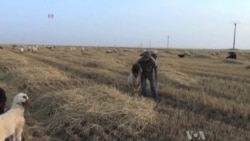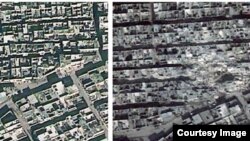LONDON —
Fields of golden wheat sway in the midsummer wind on the plains of Aleppo province. But amid this scene of agricultural productivity, blackened clearings — scars of missile strikes — litter the fields.
"This year people are harvesting the land early, but they can't work because of the missiles," says one farmer who didn’t want to give his name, explaining that many are bringing crops in early, fearing what’s left in the fields could be devastated at any moment. "They can't prepare their fields for harvest next year because of the fires caused by missiles."
Market analysts call this year’s harvest the worst in three decades; shepherds say livestock are dying of starvation.
According to risk analyst Anthony Skinner of Britain-based Maplecroft, the sheer scale of devastation is forcing Syria’s government to seek commodities overseas.
"[Syrian President] Bashar al-Assad’s ambition was for self-sufficiency in order to be able to sustain his side of the conflict in combating the armed opposition movement," he says. "But what we’ve seen, of course, has been massive displacement of civilians and farmers, and they’re unable to sow their crops and unable to acquire the fertilizers and seeds and to operate normally."
Western sanctions make it difficult for commodity traders to do business with Damascus, he says, and government officials may try to access money frozen in European accounts to pay for food.
Michael Mann, EU foreign affairs spokesman, says EU sanctions include humanitarian exemptions, which means the strategy could work.
"If there is a genuine humanitarian purpose and that can be proven, and it’s cleared by the member state authority, then it can go ahead," he says. "But at the end of the day, what the Syrian regime should be doing is stopping killing its people and, rather, feeding its people."
Amid the chaos of Aleppo — Syria's largest city and the center of an ongoing territorial stalemate between state forces and rebel fighters — market sellers have set up beside a checkpoint dividing rebel- and government-held areas.
The makeshift defenses, says one fruit trader, are basic and often inadequate.
"Even though there is sniper fire, people are working as normal," he says. "God is their provider and protector."
Amnesty satellite images
Satellite images released by Amnesty International appear to show flattened buildings in civilian areas of the city, the result, says human rights agency says, of government missile attacks that leave residents scrambling to find daily staples.
"Very large sections of the city have been reduced to rubble," says Donatella Rovera, the group's Senior Crisis Response Adviser, who has just returned from Aleppo. "And of course so many civilians — children, omen, ordinary people — have been killed and maimed in the process. Those who are within the city still are finding it increasingly difficult to just meet their very basic need, even just to find bread on a daily basis."
The United Nations’ World Food Programme (WFP) says the intense fighting is hobbling efforts to deliver aid to Syrians. The group reports that it delivered aid to only 2.4 million people in Syria in July, falling short of its target 3-million people.
A recently published joint report by WFP and the United Nations Food and Agriculture Organization estimates that 4 million Syrians do not have enough to eat, a number that is expected to increase if fighting continues.
"This year people are harvesting the land early, but they can't work because of the missiles," says one farmer who didn’t want to give his name, explaining that many are bringing crops in early, fearing what’s left in the fields could be devastated at any moment. "They can't prepare their fields for harvest next year because of the fires caused by missiles."
Market analysts call this year’s harvest the worst in three decades; shepherds say livestock are dying of starvation.
According to risk analyst Anthony Skinner of Britain-based Maplecroft, the sheer scale of devastation is forcing Syria’s government to seek commodities overseas.
"[Syrian President] Bashar al-Assad’s ambition was for self-sufficiency in order to be able to sustain his side of the conflict in combating the armed opposition movement," he says. "But what we’ve seen, of course, has been massive displacement of civilians and farmers, and they’re unable to sow their crops and unable to acquire the fertilizers and seeds and to operate normally."
Western sanctions make it difficult for commodity traders to do business with Damascus, he says, and government officials may try to access money frozen in European accounts to pay for food.
Michael Mann, EU foreign affairs spokesman, says EU sanctions include humanitarian exemptions, which means the strategy could work.
"If there is a genuine humanitarian purpose and that can be proven, and it’s cleared by the member state authority, then it can go ahead," he says. "But at the end of the day, what the Syrian regime should be doing is stopping killing its people and, rather, feeding its people."
Amid the chaos of Aleppo — Syria's largest city and the center of an ongoing territorial stalemate between state forces and rebel fighters — market sellers have set up beside a checkpoint dividing rebel- and government-held areas.
The makeshift defenses, says one fruit trader, are basic and often inadequate.
"Even though there is sniper fire, people are working as normal," he says. "God is their provider and protector."
Amnesty satellite images
Satellite images released by Amnesty International appear to show flattened buildings in civilian areas of the city, the result, says human rights agency says, of government missile attacks that leave residents scrambling to find daily staples.
"Very large sections of the city have been reduced to rubble," says Donatella Rovera, the group's Senior Crisis Response Adviser, who has just returned from Aleppo. "And of course so many civilians — children, omen, ordinary people — have been killed and maimed in the process. Those who are within the city still are finding it increasingly difficult to just meet their very basic need, even just to find bread on a daily basis."
The United Nations’ World Food Programme (WFP) says the intense fighting is hobbling efforts to deliver aid to Syrians. The group reports that it delivered aid to only 2.4 million people in Syria in July, falling short of its target 3-million people.
A recently published joint report by WFP and the United Nations Food and Agriculture Organization estimates that 4 million Syrians do not have enough to eat, a number that is expected to increase if fighting continues.







